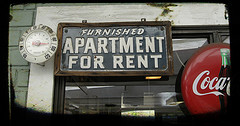8 Great Financial Tips for Renters
I spent 10 years as a renter. I rented houses, several different apartments, and a town home. I have to say I’m glad I rented throughout that period of my life. I just wasn’t settled down enough to buy, even though financially I could have purchased a home earlier, given the lending standards at the time.

If you are a renter, have no shame in not being a home owner sooner. There’s more to owning a home than just the ability to make a monthly payment. A lot of other things have to line up. But that’s another topic for another time. What I want to discuss today is being financially ready to rent, as well as some general financial tips for renting.
Maintain Good Credit – Most shrewd landlords are going to run a credit check on you before they let you in their place. Therefore, it’s important to show a clean credit history (free of defaults) and a good credit score. If this is your first time renting, you may want to do a quick check of your credit score and / or credit reports before you fill out an application so you’re not blindsided. (Check out Experian Boost to see if they can help boost your credit score.) If you have some dings on your credit, you may have to search for an apartment that doesn’t do credit checks, or you may have to fork over a bigger deposit and upfront rent.
Prepare for Deposits – Even though you don’t need a big down payment as a renter, you do usually need at least a security deposit (in case you leave the place in shambles), and sometimes even prepay first and last months rent. So, depending on the place you are renting, you could need anywhere from $500 to $5000. So start saving and be ready for the big cash outlay.
Research the Rental – Like any financial transaction, there is no guarantee that the person on the other side is going to hold up their part of the bargain, or that they place is what they say it is. There’s a myriad of things that could go wrong with your place: you could have bed bugs, bad neighbors, a landlord who won’t fix anything. This is why you should do your due diligence and help to ensure you’ll be getting into a good situation. If it’s an apartment, visit apartmentratings.com and see what others have to say about the place.
Negotiate Upfront – Before blindly accepting their asking price for the rental, feel them out and see if they are willing to negotiate. Ask for a lower monthly rent, less of a security deposit, or ask to get your utility bills covered. Finally, see if there are any repairs or improvements to the place that you could do in exchange for lesser rent. The bottom line is to negotiate.
Know Your Lease – Before you sign your lease, make sure you understand it. Ask to read over it before hand so you’re not pressured to sign quick in front of the landlord. Look for any rules or regulations that might cost you. And pay special attention to the early termination clause. If you have to break the lease, it could mean an obnoxiously large fee.
Look for Alternatives – Something that I didn’t do enough of in my renting history is look for alternatives to the big apartment complexes. You can just as easily rent small homes, garage apartments, even the guest bedroom. These may be a more comfortable fit for you and you may find a better financial experience than the one-size-fits-all treatment of the apartment complexes.
Get Renter’s Insurance – It’s a good idea to get some renter’s insurance. Very cheap, and can usually just be tacked onto an affordable auto insurance policy. Even if your stuff isn’t that valuable, renter’s insurance can help you out if someone, for instance, gets hurt in your home and tries to sue you.
Use Movable Decor – Finally, when you move into your place and decide to spruce up the place, focus on decor that you can take with you. Think lamps, rugs, plants, etc. And if you decide to paint, remember to check your lease and run it by the landlord. They may cut your rent for the month for the new paint job.
Do you have any money tips for renters? Leave them in the comments below?
photo by turkeychik






@Megan – Try Rentbits.com, craigslist.org, or meet with a local Realtor. Outside of college towns, in regular suburban hoods, many of the HOAs prevent landlords from advertising with signs and traditional methods. So the rental scene is someone underground.
Do you have any advice for finding property management company that rent houses? I moved to Denver from a Midwest college town and have had zero luck finding any houses for rent. 🙁
In the college town, there were For Rent signs up everywhere starting in May and all through the summer. It made finding housing really easy. And all the property management groups advertised like crazy, hoping to catch the attention of the new and returning students each fall. I haven’t found *anything* like that in Denver. Am I just looking in the wrong places?
Good read. Your tip are really great and a must read. This helps the renters to spend their money well.
don’t a place that you can’t afford. lots of people know they can’t afford a house, but turn around and rent something above their budget. this does not make sense. not only are you not getting equity in your home but you are paying for someone else to get equity in their home.
live for a little less and save for your future house, its worth it.
@Robert Fannie Mae & Freddie Mac have changed their policies to address the issue of legal tenants in homes that have been the subject of a foreclosure. You can get details at their website. If you have a valid suspicion that your landlord may be in financial trouble ask the landlord to set-up a collection account with an escrow or title company. The escrow/title company will then collect the rent payment and pay the mortgage each month. You’ll have to pay the fees for this service.
@Rhonda Sounds great in theory but no landlord’s going to give their personal information to a prospective tenant. Use a reputable property management company or if you’re renting from an owner use common sense, ask questions and see my suggestion about an escrow/collection account above.
@Robert – Oh, good one. In times like these that’s a valid point.
Combine your renters insurance policy with your auto policy for the biggest savings. Most insurance companies offer up to a 10% discount if you have two or more policies and considering most renters policies cost less than $15/month, you can negate the entire cost of the premium of you combine policies.
House renters should also consider the ability of the landlord to continue making the mortgage. Even though a prospective renter would probably not ask directly, one might want to observe the situation and ask tangential questions, such as their occupation, where they live, etc. that could come up in small talk. I’ve dealt with rental clients whose homes have gone into foreclosure and it is a very tough situation.
@SAFTM – Great point. Again, something renters and landlord can take note of.
I would add to pay your rent a few days early – yes early! My wife and I each own property (in another state…long story) but rent where we live. We send our check in by the 25th and our landlord loves it. And when tenants in our properties pay on time or early (i.e. not on the 5th – on the 1st or before) and take care of the places, those are tenants we want to keep!
What’s my point? We’ve been able to avoid a raise in rents because our landlord doesn’t want to lose us. Just one month of vacancy or the uncertainty of a new tenant is worth it to him to give us a break in the monthly rent. Remember that certainty of rent is “of value” to the landlord. Pay your rent a few days early and you’ll stand out in a way that can save (or make) you money.
If people stay for a period of time w/ the same landlord – they should open the re-negotiation door annually.
@Jenna – great point about grilling the neighbors.
@Betty – good advice for renters and landlords.
PT,
My tenants must have renter’s insurance.
4 years ago, one of my rentals caught on fire. My landlord policy covered the following: replacing the carpeting, window coverings, appliances, counter tops, drywall and paint. My insurance company also reimbursed me the rent each month during the 8 months of construction. My tenant’s insurance covered: replacing her clothing and furniture plus they provided temporary housing during the construction.
Without insurance my tenant would have lost a ton of money and I would have lost a good tenant (who ended up buying the house.)
Talk to people in the neighborhood, other renters, find out what they love and hate about the location.